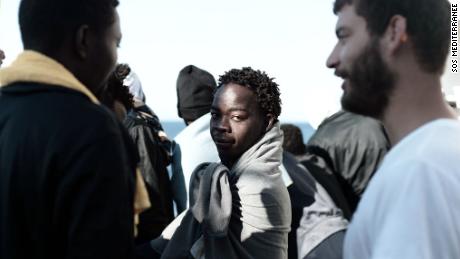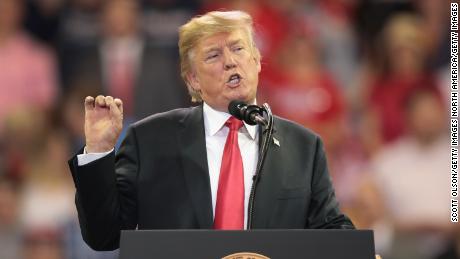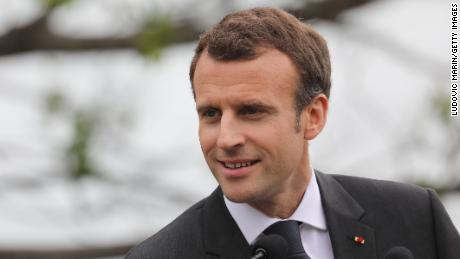(CNN)Ever since he left the White House, Steve Bannon has been scouring the world for new opportunities to promote his brand of populism: a revolt against liberal elites, migration and multiculturalism -- and the revival of the nation state.
Bannon, once Donald Trump's ideological sidekick, has found the perfect partner in Matteo Salvini, Italy's Interior Minister and leader of the League, one of two parties in the new coalition government in Rome.
Salvini is an admirer of Vladimir Putin, prefers social media to mainstream media, trumpets economic nationalism and makes controversial remarks about foreigners and migrants. He's ripped more than a few pages out of Trump's playbook. Even his election slogan was "Italians first."
In the past week, as the United States has been consumed by the treatment of migrant families at the border, Salvini has closed Italian ports to rescue ships carrying migrants. It did him no harm in the polls. The League is two percentage points higher than at the beginning of June.
Just as Trump's supporters railed against illegal migrants crossing the Mexican border, so Italians were infuriated by Europe's disjointed response to the surge in migration across the Mediterranean, which left the countries where migrants landed dealing with most of the burden. More than 600,000 have landed in Italy since 2013.
"The burden should have been shared," Italian Prime Minister Giuseppe Conte said this month.
Still more controversial is Salvini's announcement of a census of Italy's Roma population. Last year, he said: "We need a mass cleansing, street by street, piazza by piazza, neighborhood by neighborhood. We need to be tough because there are entire parts of our cities, entire parts of Italy, that are out of control."
He suggested then that Italy needed policies similar to those championed by President Trump. This week, Trump said: "We have to have a very tough policy" on illegal immigration. "We have no choice."
An unlikely alliance
The League came to power this month in coalition with the Five Star Movement (5SM), another insurgent, anti-establishment party.
Bannon says that when the two parties emerged as the largest in the March elections, he pitched an unlikely alliance of 5SM and the League to Salvini, telling him: "You are the first guys who can really break the left and right paradigm."
It was music to Salvini's ears. In 2015 he had told political scientist Alessandro Franzi: "The distinction between right and left is no longer effective, because today the alternative is between those who are small and those who are big, between the people and the European financial establishment."
The Bannon/Salvini playbook goes far beyond migration. Bannon told an audience in Italy: "Look at how they roll. Foreign powers, foreign capital, foreign media took from the Italian people its sovereignty."
That anti-corporate tone is at the heart of the new coalition's platform.
Bannon saw similar in Trump's candidacy -- one that shook up party allegiances as Trump tapped into the anger of those he called the "less educated," those marginalized by automation, the decline of manufacturing and migrants willing to work for less. Even this week, Trump was having another go at the elites
Last month, Bannon said: "The working-class, blue-collar workers in the US and the middle class were completely abused by the globalist elite that ran the country for the last 20 or 30 years and Trump's victory was a complete rejection of that."
He made those remarks in Hungary, whose leader, Viktor Orban, he sees as another flag-bearer in this revolution. Orban is "Trump before Trump," Bannon declared. This week Orban said that Hungary, Poland, the Czech Republic and Slovakia had agreed to establishing "hot spot" centers to process migrants outside EU borders.
Bannon sees much of Europe as fertile territory for his populist revolution. In March he appeared at the conference of the far-right Front National in France, saying: "Let them call you racist. Wear it as a badge of honor."
He is also close to Nigel Farage, the public face of the Brexit movement and former leader of the UK Independence Party.
Another popular target for Bannon, Salvini, Farage and the rest of the insurgency is the mainstream media. In an interview this year, Bannon called the Financial Times, the BBC, the Wall Street Journal and the Economist "the propaganda department of the globalists."
Salvini (like Trump) has gotten more personal. This week the author Roberto Saviano said: "Italians are going backwards socially, amid an upsurge of nationalism that displays racist animus against anything perceived to be an alien body." Salvini responded by threatening to withdraw the police protection Saviano has had since writing an expos├® of the mafia.
Plenty of column inches have been devoted to describing these populist movements as harbingers of a new fascism, whose leaders pick on minorities, use covert and overt racism, undermine the principle that dissent is part of democracy, promote economic nationalism and decry international cooperation.
But parallels with the 1930s are overdone (where are the mass unemployment and the shock troops on the streets?). Historian James McDougall says the real threat is "a democracy reduced to the tyranny of tiny majorities who find emotional satisfaction in a violent, resentful rhetoric while their narrowly elected leaders strip away their rights and persecute their neighbors."
French President Macron said Thursday that such forces were rising "a bit like a leprosy all across Europe, in countries where we thought that it would be impossible to see them again."
Salvini, like Farage and Bannon, says such criticism is the inevitable whining of the elites as their control wanes. When Macron criticized Italy's refusal to accept 600 migrants stranded on board a rescue vessel, Salvini dismissed him as a "chatterbox."
"There are those who talk and those who act," Salvini said.
But the talk is getting more vituperative by the day, so the EU's summit on migration this weekend won't be dull.








